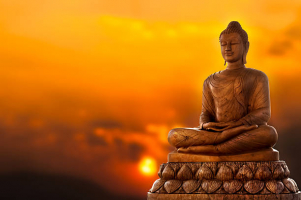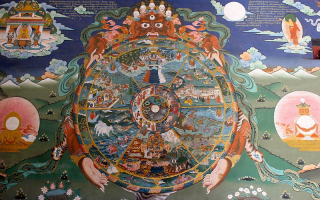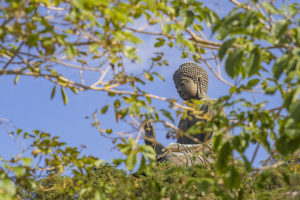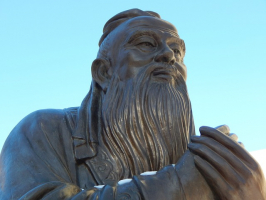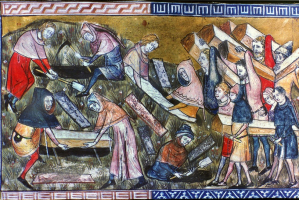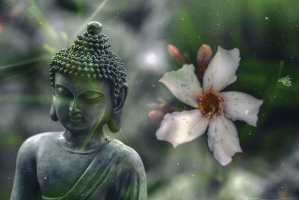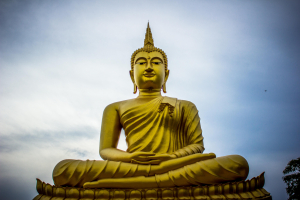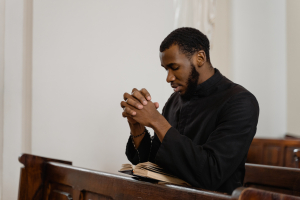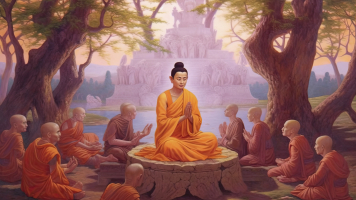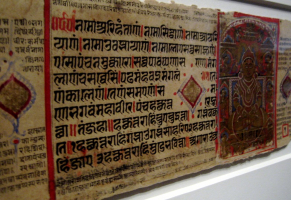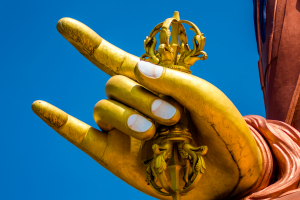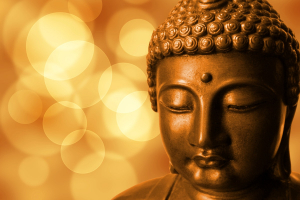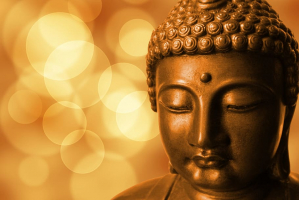Top 10 Major Buddhism Beliefs About Death
In Buddhist thought, contemplation on the intricate tapestry of life and death has given rise to profound beliefs that shape the essence of existence. Let's ... read more...delve further into the 10 major Buddhism beliefs about death, exploring the intricate interplay of impermanence, rebirth, karma, and the ultimate pursuit of liberation.
-
Within Buddhism, the understanding prevails that all conditioned phenomena, encompassing life and death, are inherently transient. This comprehension of impermanence (Anicca) fosters an acceptance of death as an intrinsic facet of the cyclical nature of existence.
A fundamental lesson in Buddhism emphasizes that suffering arises from attachment to impermanent elements. Regarding death, the inclination to attach oneself to the concept of an enduring self and relationships, possessions, and experiences can magnify the anguish linked to bereavement. Acknowledging impermanence prompts individuals to nurture detachment, thereby mitigating the extent of suffering experienced when confronting death.
Within certain Buddhist traditions, comprehending impermanence and the cycle of rebirth drives practitioners to nurture benevolent karma and partake in virtuous endeavors. This groundwork is considered significant not solely for the current existence but also for influencing the circumstances of subsequent lifetimes.
Essentially, impermanence operates as a prism through which Buddhists perceive death, molding their outlooks, convictions, and practices concerning mortality, passing away, and the afterlife. By embracing impermanence and seamlessly incorporating it into their worldview, Buddhists aspire to uncover purpose and metamorphosis even when confronting the inevitability of death.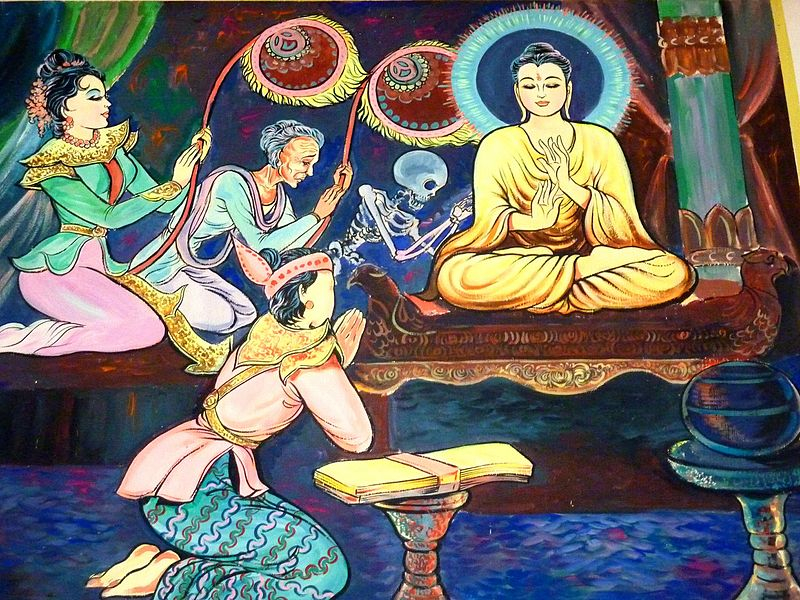
Teaching Impermanence - Photo on Wikimedia Commons (https://commons.wikimedia.org/wiki/File:056_Teaching_Impermanence_%289014223736%29.jpg) 
Photo on Pixabay (https://pixabay.com/photos/buddhism-monk-temple-panorama-2214532/) -
Reincarnation is central to Buddhism's beliefs about death, providing unique viewpoints on the uninterrupted flow of consciousness and the cyclic nature of existence. Reincarnation entails the journey where an individual's consciousness embraces a fresh physical or mental form upon death. This unbroken stream of awareness suggests that the essence of an individual endures beyond the confines of demise.
Reincarnation maintains a profound connection with the law of karma, which asserts that every action carries repercussions. Constructive activities produce positive karma, whereas detrimental actions result in negative karma. These imprints of karma wield influence over the conditions of subsequent rebirths. The perpetual sequence of birth, death, and resurrection persists until an individual transcends the cycle, achieving liberation through spiritual enlightenment.
Reincarnation opens the possibility of experiencing rebirth across various realms of existence, collectively called the "Six Realms." These realms encompass celestial, human, animal, hungry ghost, infernal, and divine dimensions. The domain into which an individual is reborn is shaped by the amalgamation of their accumulated karma and prevailing mental disposition.
The conviction in reincarnation catalyzes virtuous living, given that one's deeds in each existence intricately mold the tapestry of their forthcoming lifetimes. Buddhists dedicate themselves to nurturing constructive karma through acts of virtue, generosity, compassion, and meditative practice, intending to foster propitious circumstances in their subsequent reincarnation.
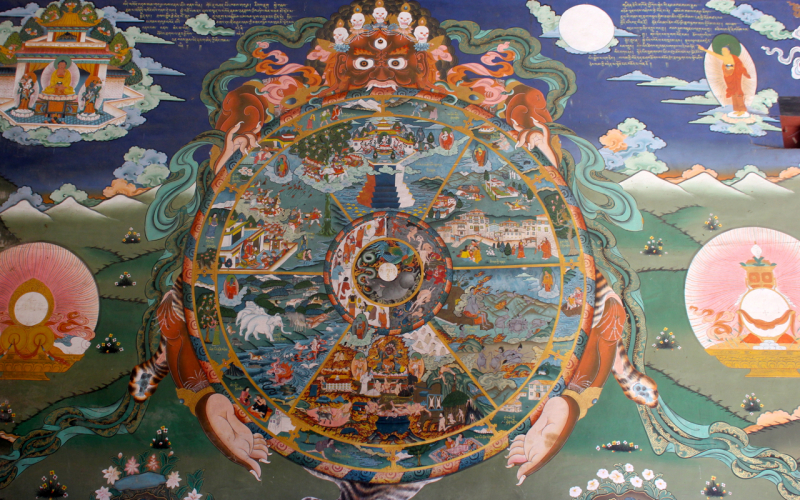
Reincarnation - Photo on Wikimedia Commons (https://commons.wikimedia.org/wiki/File:The_wheel_of_life,_Buddhism_Bhavachakra.jpg) 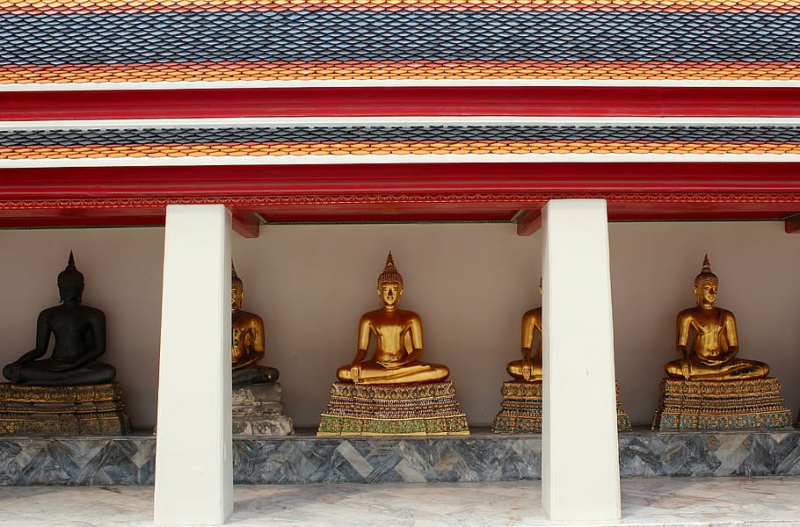
Royalty-free reincarnations photos on Pxfuel -
In Buddhism, it is held that karma, the principle of cause and effect, mold the circumstances of one's forthcoming rebirth. Constructive actions engender positive karma, culminating in a more auspicious rebirth in elevated realms, whereas harmful efforts yield negative karma, carrying the potential for regeneration in lower realms. This interlinking of karma and rebirth underscores the significance of leading an ethical life and making responsible choices, for they directly shape an individual's destiny beyond death.
The concept of karma within Buddhism illuminates the essence of suffering. Practitioners acknowledge that suffering within the cycle of samsara arises from unfavorable karma. As a result, alleviating the sources of suffering entails more than comprehending impermanence and attachment; it also encompasses the proactive endeavor to amass positive karma through ethical behavior, acts of generosity, and compassion.
The comprehension of karma is a driving force for Buddhists to lead lives of mindfulness and virtue, enhance their present existence, and establish favorable circumstances for life beyond. Through the cultivation of virtuous karma, individuals aspire to secure a more advantageous rebirth and diminish the likelihood of suffering in forthcoming lifetimes.
In essence, karma is a foundational principle molding Buddhists' perspectives on death and the persistence of consciousness. It emphasizes the significance of leading an ethical life, making conscientious choices, and mindfully readying oneself for the afterlife. These endeavors foster favorable conditions for forthcoming lives, fostering the journey toward liberation from the cyclic wheel of samsara.
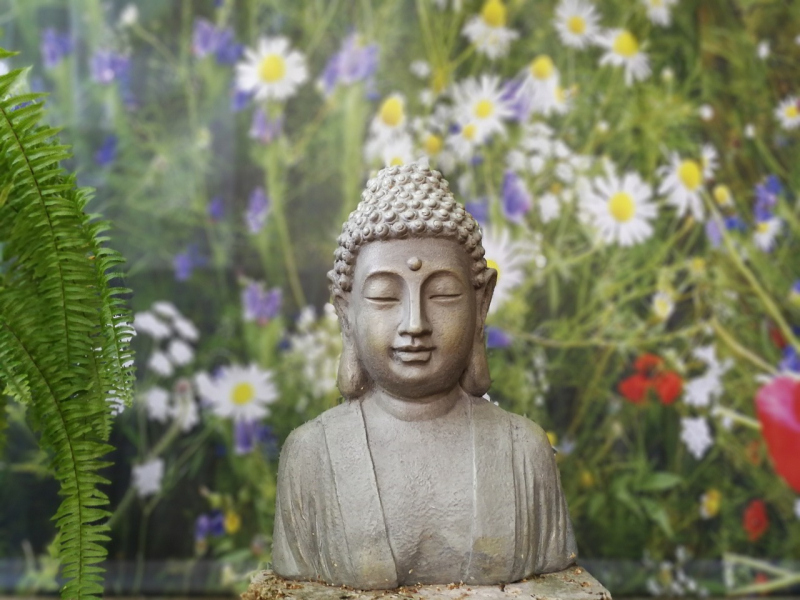
Photo on Pixabay (https://pixabay.com/photos/garden-statue-fern-buddha-statue-3398101/) 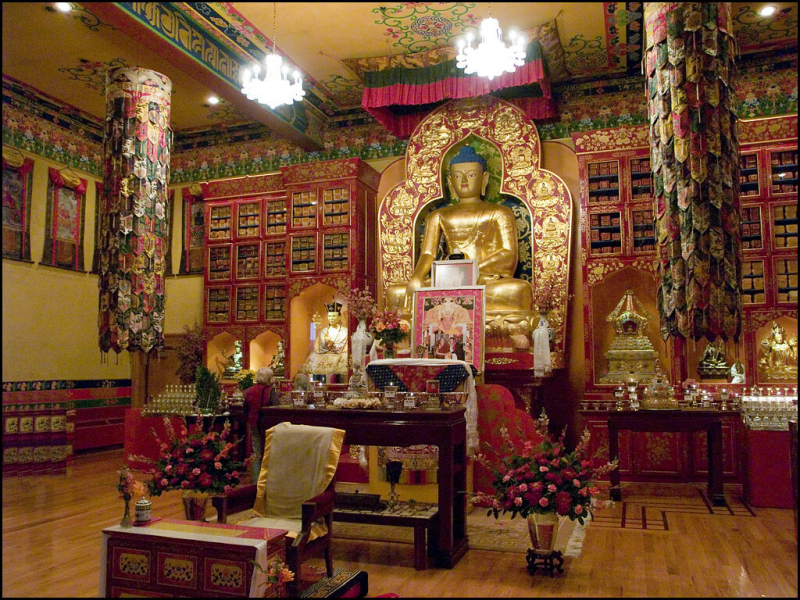
Karma Triyana Dharmachakra - Photo on Flickr (https://www.flickr.com/photos/waywuwei/279464565) -
The attainment of Nirvana, commonly understood as liberation from Samsara, is pivotal in Buddhism's understanding of death. Nirvana signifies absolute freedom from suffering, discontentment, and the ceaseless cycle of birth, death, and rebirth. This state marks the culmination of struggles and hardships embedded in mundane life. Buddhists strive for Nirvana as an avenue to transcend the inherent suffering and pervasive sense of dissatisfaction inherent in the samsaric cycle.
The cycle of samsara persists due to the interplay of karma, attachment, and ignorance. Achieving Nirvana entails liberating oneself from these entanglements. It symbolizes the ultimate liberation from the repetitive cycles of birth, aging, illness, and death, enabling individuals to transcend the limitations of the material realm.
Diverse Buddhist traditions present distinct avenues toward attaining Nirvana. Theravada Buddhism underscores personal endeavor and individual emancipation, whereas Mahayana Buddhism places heightened importance on compassion and the liberation of all sentient beings. Irrespective of the chosen path, the objective remains constant: attaining enlightenment and ultimate freedom.
In essence, the notion of Liberation from Samsara encompasses the paramount aspiration of Buddhists: to surpass suffering and the perpetual cycles of birth and death and to reach a state of impeccable tranquility, wisdom, and emancipation. This concept profoundly influences how Buddhists comprehend and navigate end, guiding their spiritual endeavors and shaping their perspective on the essence of existence.
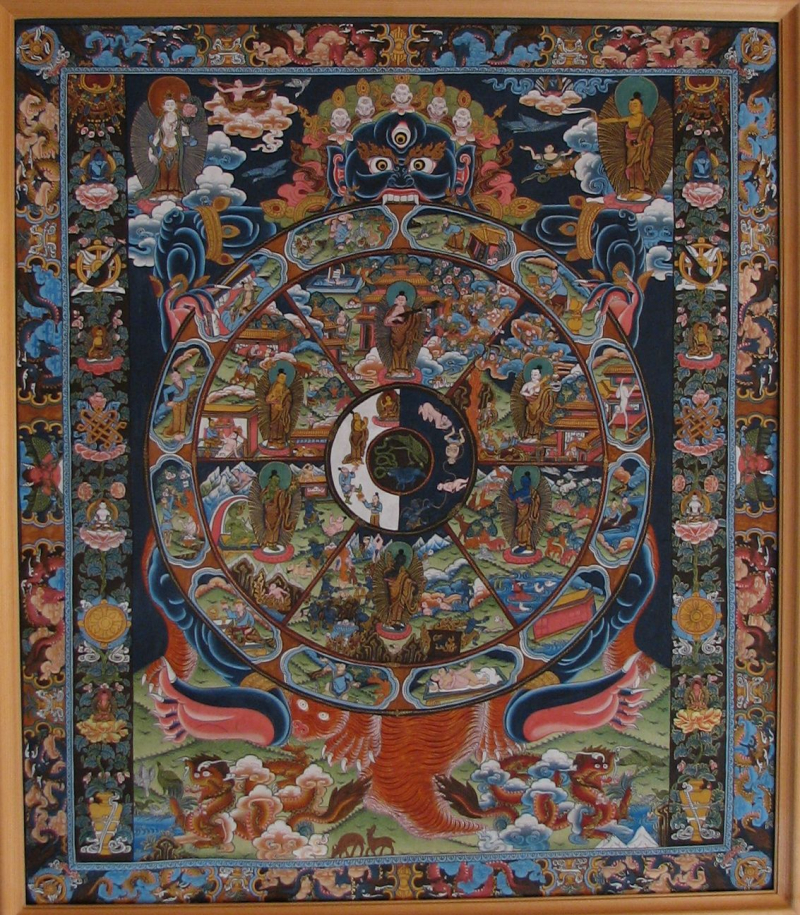
Bhavacakra - Photo on Wikimedia Commons (https://commons.wikimedia.org/wiki/File:Bhavacakra.jpg) 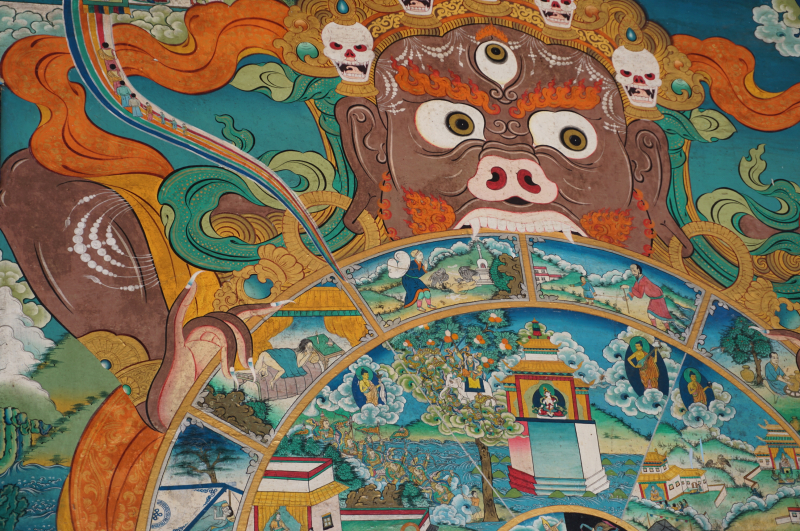
Samsara - Photo on Wikimedia Commons (https://commons.wikimedia.org/wiki/File:Samsara_-_Ganden_Monastery_%28Karnataka_-_India%29_%2833306602720%29.jpg) -
The Process of Dying is notable in Buddhism's perspectives on mortality, encompassing the human and spiritual aspects of moving from one existence to the next. Buddhism underscores the cultivation of mindfulness and vigilance throughout life, and this emphasis extends to the dying process. Practitioners are guided to uphold a state of clear and immediate awareness as they near death, fostering a sense of mental clarity and serenity.
Buddhists believe that the mental state at the juncture of death profoundly influences the consciousness that continues into the subsequent life. A serene and optimistic state of mind is advantageous, as it can facilitate a more propitious rebirth. Through relinquishing material possessions, relationships, and desires, individuals aspire to diminish the possibility of suffering and create a smoother path for the transition.
The Process of Dying is a pivotal juncture that shapes the individual's subsequent rebirth. Upholding affirmative thoughts, virtuous aspirations, and a tranquil state of mind during the moments of death can play a role in cultivating positive karma, thus potentially enhancing the prospects of a more advantageous rebirth.
To encapsulate, The Process of Dying within Buddhism encompasses mindful awareness, detachment from attachments, and cultivating a positive state of mind. This phase allows practitioners to put their spiritual teachings and convictions into practice, guiding them through the transitional realm of death.
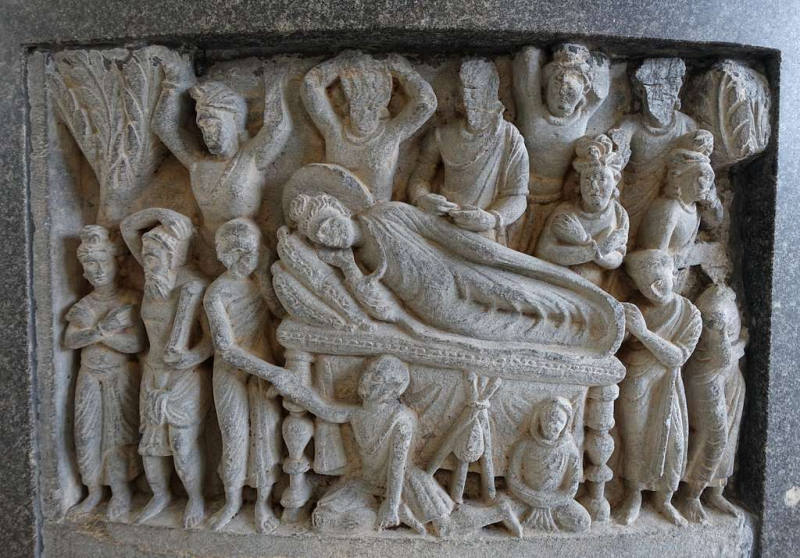
Photo on Wikimedia Commons (https://picryl.com/media/death-of-the-buddha-pakistan-kushan-period-200s-ad-stone-hakone-museum-of-art-8fbf1f) 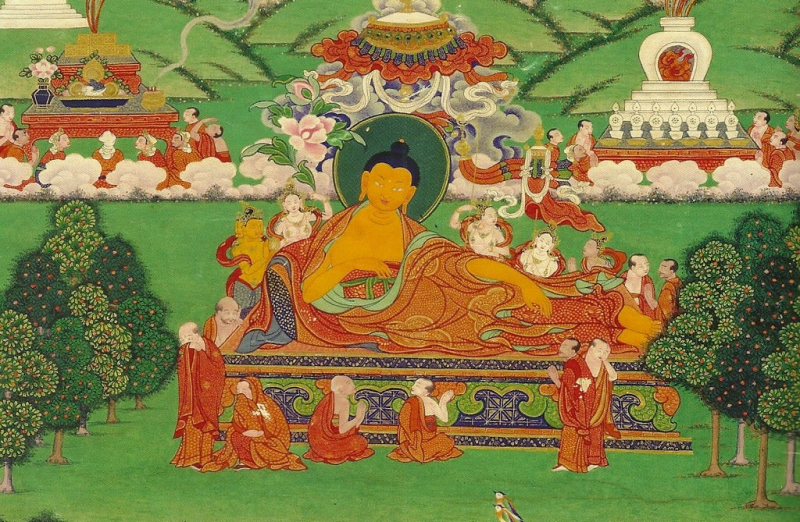
Photo on Flickr (https://www.flickr.com/photos/nat507/42004606501) -
Funeral customs play a significant role in expressing Buddhism's beliefs about death and the journey beyond. These customs frequently encompass an array of rituals, serving practical and symbolic objectives alike. Such practices may contain the chanting of scriptures, recitations, and offerings, all intended to steer the consciousness of the departed and foster a constructive atmosphere for their onward voyage.
Cremation is a widespread tradition in numerous Buddhist cultures. The act of cremating the body is a poignant symbol of the transient nature of the physical realm and facilitates the elemental return to the natural world. Close companions and family members of the departed frequently present offerings of nourishment, blossoms, and candles to amass merit in honor of the deceased. This accrued merit is thought to provide sustenance for the departed's voyage and forthcoming rebirths.
Recitations of Buddhist scriptures and prayers commonly resonate throughout funeral ceremonies. These reverberations of sacred chants bestow blessings and channel affirmative energies toward the departed, offering support in their passage to the next phase of existence. After the funeral, there may be ongoing practices such as regular prayers, dedications, and acts of generosity to continue supporting the deceased's journey.
Essentially, Buddhist funeral customs manifest as palpable manifestations of the belief in impermanence and the perpetual cycle of birth and death. They establish a structure that pays homage to the departed and serves as a poignant reminder to the living, urging them to nurture a life imbued with significance and compassion.
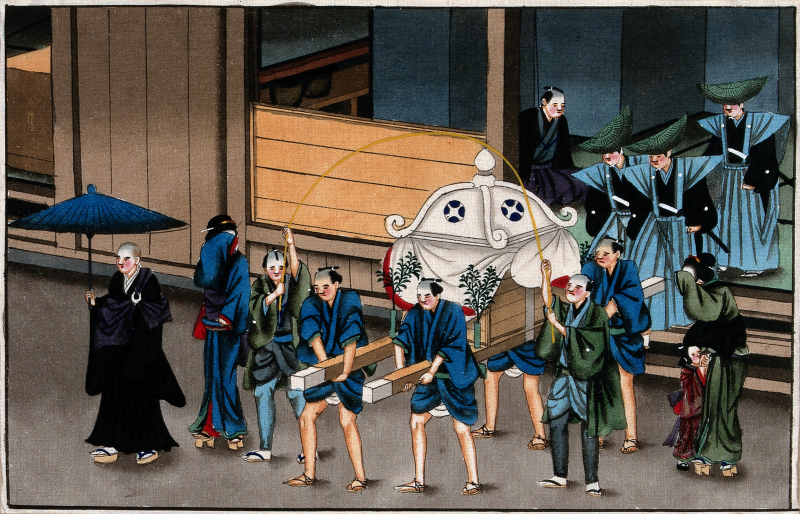
Photo on Wikimedia Commons (https://commons.wikimedia.org/wiki/File:Japanese_funeral_customs_-_the_procession_leaves_the_house_Wellcome_V0046657.jpg) 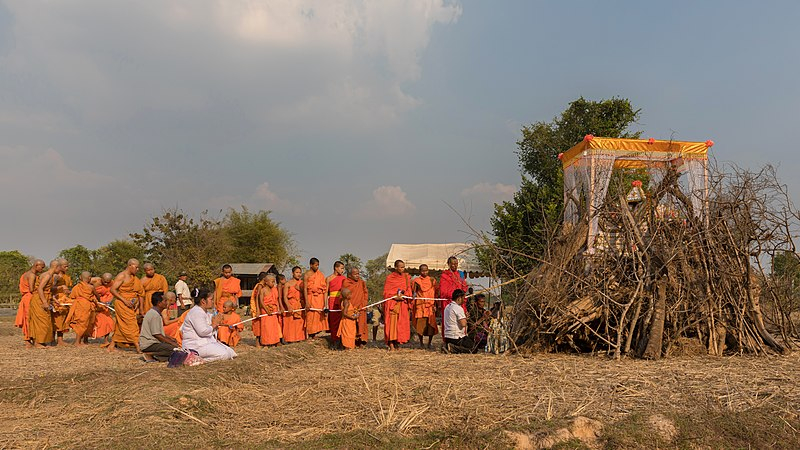
Photo on Wikimedia Commons (https://commons.wikimedia.org/wiki/File:Buddhist_monks_procession_in_front_of_a_pyre.jpg) -
Monastics, encompassing monks and nuns, frequently assume a crucial role in extending spiritual guidance to individuals confronting death. Their teachings encompass impermanence, karma, and the path to liberation, facilitating an approach to the end characterized by comprehension and embracing.
Chanting scriptures and meditation, monastics oversee prevalent rituals throughout the dying process and funeral ceremonies. These practices are aimed at channeling positive energy, alleviating distress, and guiding the consciousness of the departed. Besides, Monastics often lead funeral ceremonies, guiding attendees through rituals that honor the deceased and provide an opportunity for reflection on the nature of life and death.
Monastics extend comfort and consolation to bereaved family members and friends, imparting a compassionate presence and offering guidance through the grief journey. In certain Buddhist traditions, the invitation of monastics to conduct ceremonies and rituals is deemed a virtuous deed, capable of amassing positive karma for both the departed and the living.
In essence, monastics are multifaceted in Buddhism's beliefs about death. They provide spiritual guidance, perform rituals, and extend solace to those approaching the end and those in mourning. Their presence and teachings aid individuals in navigating the profound journey of death while strengthening fundamental Buddhist tenets of impermanence and the quest for liberation.
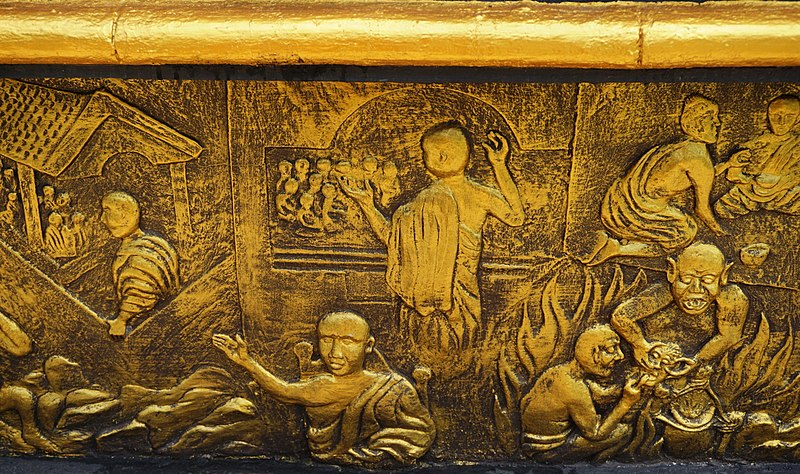
Photo on Wikimedia Commons (https://commons.wikimedia.org/wiki/File:076_Monastics_Point_the_Way_%2826595399578%29.jpg) 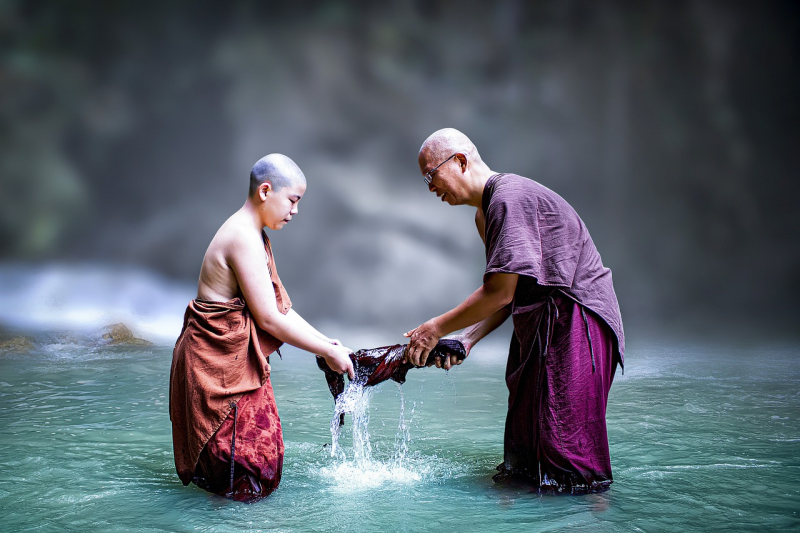
Photo on Pixabay (https://pixabay.com/photos/theravada-buddhism-monk-bhikkhu-4750321/) -
The reverence of ancestors occupies a meaningful role within Buddhism's perspective on death, exemplifying the tradition's esteem for those who have transitioned and its focus on interconnectedness and thankfulness. Buddhists pay homage to their forebears to acknowledge the interwoven nature of all existence and convey appreciation for the enduring impact they have imparted. This custom nurtures profound gratitude for preceding generations' invaluable contributions and selfless offerings.
Via ceremonial acts and sacred rituals, Buddhists present offerings of nourishment, blossoms, fragrant incense, and other symbolic tokens to honor their ancestors. The accrued merit from these gestures is thought to bestow favor upon the departed, cultivating propitious circumstances for their passage through the realms beyond.
The reverence for ancestors fosters the enduring connection of the familial bond, even in the face of death. Buddhists engage in the recitation of scriptures and the offering of prayers in honor of their forebears. These rituals are designed to provide guidance and bolster the departed, aiding them in traversing the afterlife's realms and, potentially, attaining a more auspicious rebirth.
The reverence for ancestors within Buddhism echoes a profound recognition of the interconnected tapestry of all existence and the enduring bonds that persist beyond mortality. This practice establishes a structure through which gratitude is conveyed, positive karma is generated, and virtues resonant with Buddhist values are nurtured. Simultaneously, it extends solace and assistance to individuals navigating the grieving process, offering them comfort and support as they mourn the departure of cherished companions.
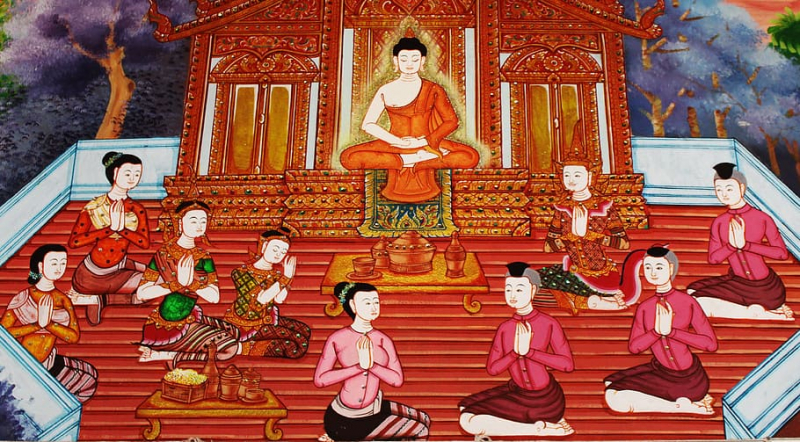
Photo on pxfuel (https://www.pxfuel.com/en/search?q=temple+of+love) 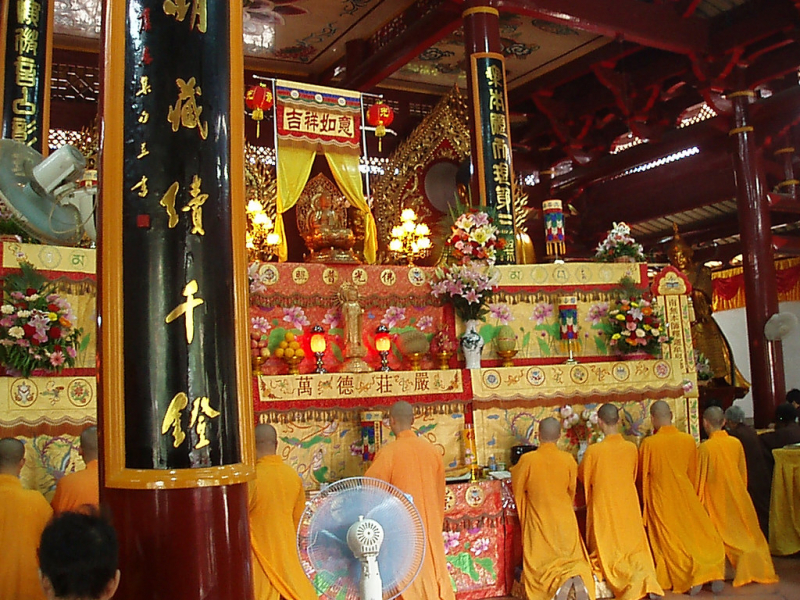
Photo on flickr (https://www.flickr.com/photos/buddhistdeathproject/8582972407/) -
Merit dedication is prominent in Buddhism's views on death, offering a means to amass positive karma and extend support to the departed as they navigate the transition and future rebirths. Within Buddhism, the principle of karma asserts that actions shape the circumstances of forthcoming lives. By dedicating merit to those who have passed, individuals strive to cultivate positive karma on their behalf, potentially shaping a more advantageous path in their subsequent existence.
Engaging in merit dedication embodies compassion and selflessness, exemplifying the core Buddhist principle of fostering benevolence and constructive energies. This practice extends beyond personal boundaries, radiating goodwill and positive influence for oneself and others, encompassing even those who have transitioned.
Merit can be conveyed to the departed through diverse methods, encompassing acts like presenting offerings, enacting virtuous deeds, reciting prayers, or immersing oneself in meditation. These endeavors are propelled by the intention to benefit those who have passed and contribute to their spiritual advancement.
Merit dedication generates a constructive vitality capable of harmonizing and offsetting any adverse karma accumulated by the departed. This affirmative energy holds the potential to foster a more auspicious rebirth or even catalyze advancement on the path toward enlightenment. It offers a means to accumulate positive karma and contributes to individuals' overall well-being and spiritual journey, even after their passing.
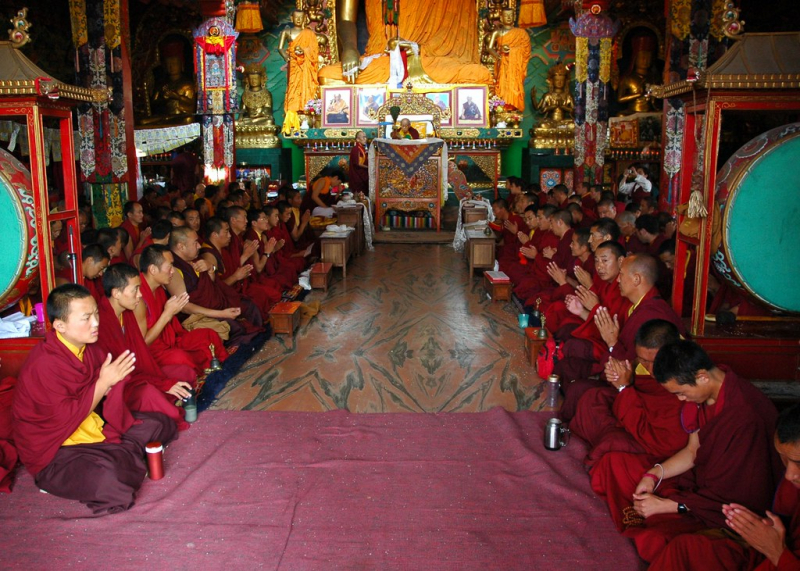
Photo on Flickr (https://www.flickr.com/photos/wonderlane/4677988114) 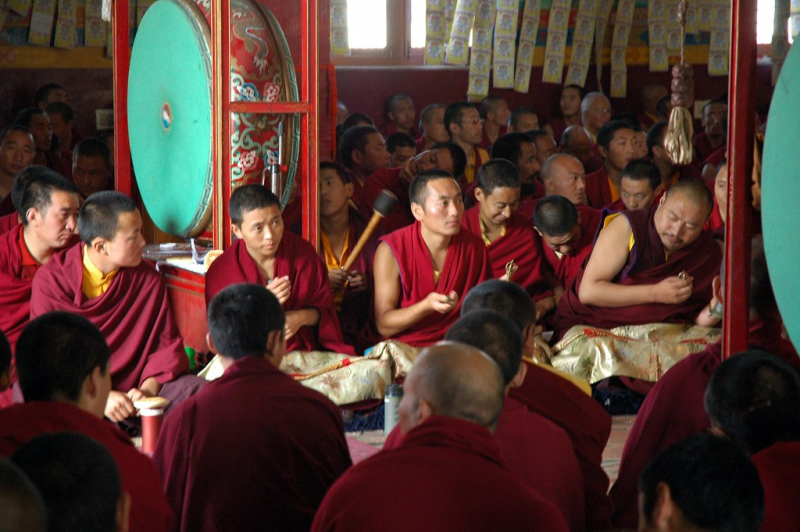
Photo on Flickr (https://www.flickr.com/photos/wonderlane/4677920082) -
The condition of having a pure mind at the moment of death assumes profound importance within Buddhism's perspectives on the passage beyond. Buddhists maintain that the quality of one's mind during this pivotal juncture significantly shapes the disposition of consciousness in the subsequent rebirth. A tranquil, lucid mind devoid of attachment holds the potential to usher in a more advantageous revival or even pave the way to liberation from the cyclic wheel of samsara.
Nurturing purity of mind entails releasing attachments to mundane worries, desires, and regrets. This state of detachment empowers individuals to approach death with a serene calmness, liberated from the grip of impermanent elements.
Achieving a state of purity of mind at death approaches is perceived as a deliberate readiness for the voyage into the afterlife. This endeavor sets the stage for a more optimistic encounter within realms beyond, lessening the likelihood of encountering suffering and adversities.
The quest for purity of mind intertwines fundamental Buddhist doctrines, encompassing impermanence, non-attachment, and ethical principles. It is a pragmatic embodiment of these teachings during a pivotal and crucial juncture.
Fundamentally, attaining a pure mind at the threshold of death highlights the importance of nurturing inner growth and mental clarity as individuals draw near to the culmination of their earthly existence. It encapsulates the essence of Buddhist teachings and sagacity, providing a guiding route to traverse the passage from life to the unknown with tranquility and purpose.
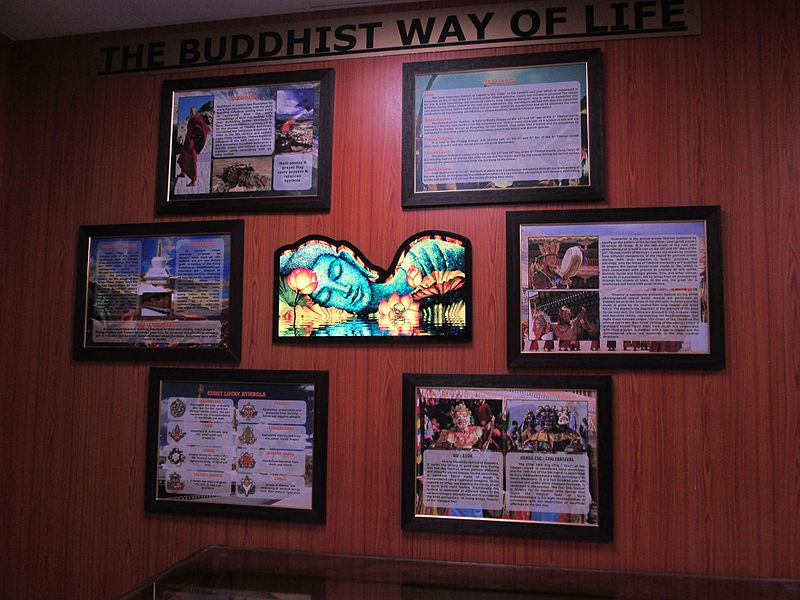
Photo on Wikimedia Commons (https://commons.wikimedia.org/wiki/File:Leh_-_Hall_of_Fame_Museum_%283%29.jpg) Video by Brodie Biology












